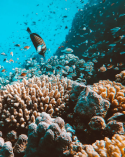
What in the World has SCUBA to do with science fiction writing? EVERYTHING! Science fiction (sci-fi) is defined in Wikipedia as “a genre of speculative fiction, which typically deals with imaginative and futuristic concepts such as advanced science and technology, space exploration, time travel, parallel universes, and extraterrestrial life.” That definition of science fiction relatively fits SCUBA. So, what is SCUBA? That is an acronym that stands for “Self-Contained Underwater Breathing Apparatus.”
Allow me to give you some background. My experience overcoming my near failure of passing the second grade in school, with my mother’s guidance, launched me into a reading frenzy. As an adolescent, one of the books I inhaled was “The Silent World” by Jaques Cousteau. This book details his invention of SCUBA and his adventures underwater at the end of World War II. He tells of ‘advanced science and technology’ that allowed him and his companions to float freely and explore ‘space’ (underwater). It felt like he had been transported to a ‘parallel universe’ as if they had experienced ‘time travel’.
My family lived in arid South-West Texas where there was little water. However, my father encouraged my adventurous spirit and he helped me purchase the diving equipment I needed. Reading manuals, he and I both learned to SCUBA dive (self-taught) in swimming pools. We dove in many lakes in Texas, most of which did not have the best visibility. And, we went on one fishing trip to Guaymas, Mexico in Baja California where I spent a lot of time diving on reefs.
After I graduated high school, and before I joined the Navy, I used my saved work money to attend a deep sea diving school at Ft. Lauderdale, Florida. I would like to relate an event during that school period that sparked a desire to experience exotic worlds similar to science fiction and time travel. There were many segments at the school, but the first segment was becoming a SCUBA instructor. In the class’s qualification dive at the end of that segment, the instructor transported the students in a large launch into the Gulf Stream East of Ft. Lauderdale. We went several miles out that calm day when the water’s surface was like glass. Although the water depth was 300 feet, the requirement was for us to spend only a brief time at 150 feet. We were then to decompress in stages on the way up to remove carbon dioxide absorbed in our blood.
The instructor dangled an anchor at 150 feet as we drifted, which was the target depth for our qualification dive. I donned my diving gear and we jointly bailed over backward into the still water. When I looked down, in shock, I instinctively grabbed the boat rail. The water was so clear that it did not seem like water. I could see hundreds of yards in every direction as if I was floating in air. I could see the coral reef below and it looked as if I was viewing the length of a football field on land but straight down.
As a group, we swam down the anchor line to the block of metal suspended in apparent mid-space. In the emerald blue environment that seemed to spread to infinity in every direction, the only sounds were those of our breathing regulators. When we inhaled, there was the distinct sound of compressed air being released into our mouthpieces. And when we exhaled, the burbling sound of exhaust air bursting from our devices turned to silence. The multiple, massive silvery, saucer-shaped bubbles raced to the surface decreasing in visual size as they distanced from us and disappeared.
Below, one hundred fifty feet down, was the sea floor, a colorful coral reef, where we could see many groupers and smaller fish swimming about. There were also a lot of sharks. They seemed undisturbed by the tasty morsels floating distantly above them. It was a haunting vision of us floating in space, peaking down at an alien environment.
We remained at the anchor station but a brief time to avoid the eminent, dangerous effects of decompression sickness. With extended time at depth, increased nitrogen absorbed into our blood would require longer stops on the way up to safely exhaust the excess. Because of our limited air tank capacities, that would require time we did not have. At the end of our scheduled period at depth, we swam up to complete several planned decompression stops before exiting the water and returning to the diving school on shore.
Visions like this have influenced my writing of science fiction. I can write about exotic parallel universes, because … I have been there.